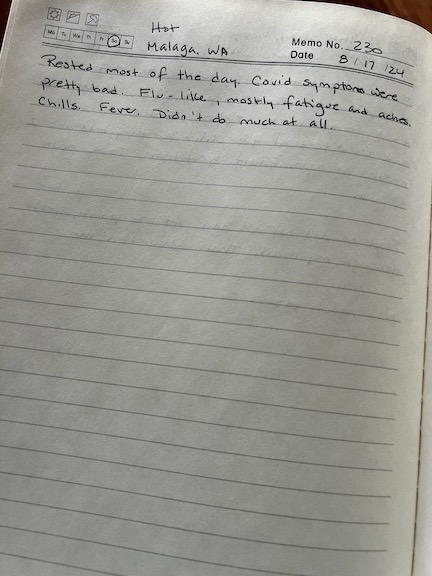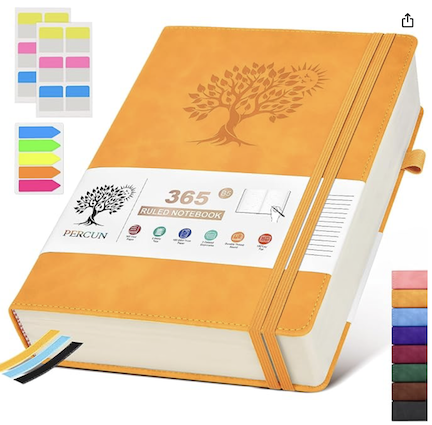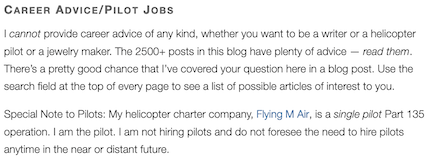I start, on January 1, to keep a daily journal and 10 1/2 months later, I’m still at it.
Over the years, I have tried and mostly failed to keep a daily journal of the things going on in my life. I’d start with good intentions and then stop, mostly because I forgot to keep writing. Then I’d start up again, swearing I’d keep at it, but then stop.
What I Tried
I tried handwritten journals in beautiful blank books. Stopping midway through one of them was especially painful since I really wanted to fill them and have a record of a long, uninterrupted period in a really nice looking book.
I tried using calendar-style planners with a whole week on each spread. Not much space to write there; I could simply put down a few bullet points about my day. These suffered the same fate. I have many partially completed calendar books floating around my home.
I tried marble notebooks like the ones we used in elementary school. The local Fred Meyer sells them for just 50¢ each once the Back to School buying rush is over. I have a lot of them. (I have a paper addiction.) They fared no better than all the other handwritten options.
And yes, I tried digital journalling. I tried apps designed just for that purpose. (I was very excited about Apple’s Journal app until I actually tried it; what good is a digital journal if you can’t export or print it? How many people will be using the same Journal app in 20 years? Definitely not me.)

As you can see in the sidebar for my Scrivener Journal document, I was very bad about writing journal entries.
I also tried using Scrivener, the darling of the writing world. I created a Journal file with folders for months and files for days. The screenshot of the document’s sidebar shown here should give you an idea of how that went.
Understand that my desire to journal every day has been very intense throughout my life. Heck, this blog was started as a journal of sorts. Not a daily journal but just a journal of the interesting things I was doing or thinking that I wanted to share.
That desire ramped up as I aged and I started forgetting about things I’d seen or done. The only remnant — or trigger, in some cases — of a memory was a photo I took at the time. But I don’t take photos of everything. I worried that I was permanently forgetting the things I did, things I might want to remember in the future.
Things that would be so simple to just jot down right after they happened.
In a journal.
Another Try
This came to a head when I was trying to write up the days of my Great Loop trip in the My Great Loop Adventure blog I created to document the entire trip. It isn’t easy to blog in detail every day so I slacked off. And then, when I was trying to fill in the gaps in the blog, I realized that I just couldn’t remember the details I wanted to share.
I needed to do something about this. My memory was starting to get iffy and I didn’t want to lose days of my life. I had to try journaling again and stick to it this time.
I started on January 1. I prepared by buying a very nice journal book on Amazon (don’t judge me) that had 365 pages. One page per day. They were not dated or numbered but they did have spaces for both bits of info. And lines close enough together to fit a few hundred words.
I started on January 1 in Key West FL, where I was on my boat with my friend Jason. And, for the first time ever, I’ve kept to it, providing an entry for every single day of my life. It’s now October 16 and I have entries right through yesterday.

I backtracked to fill in the pages for days I was really suffering with Covid. All I remember from those days was sleeping.
I’ll be honest: I don’t always write every evening or the following morning like I want to. Sometimes I miss a few days and have to go back. I’ve found that going backwards from the current day usually helps. The only days when the entry is unreasonably short were the few days that I slept nearly the entire day due to my bout with Covid in August.
Why It’s Working this Time
Why am I finally doing so well at journaling this year? I think there are three reasons, one of which I already touched upon.
- Motivation. I’m tired of forgetting days and weeks of my life. I’m tired of looking at photos I shot 3 years ago and seeing places I forgot I’d visited. I don’t think my memory is any worse than the average person my age — it’s not like it’s a problem — but the only way I see being able to remember stuff is to jot notes about the day at day’s end or the following morning.
- Success leads to more success. After ten and a half months of keeping this up, I feel that I’d really be letting myself down if I didn’t continue to do it. So the more I write, the more I want to write.
- 365 single pages to fill. The book’s design makes it easy — and, in a way, required — to journal every day. There are exactly the right number of pages to fill. (Actually, there were 366 days this leap year, but I can always insert an extra sheet if I have to.) Second, the pages aren’t that big. There are only 25 lines! That’s nothing for someone like me. And who says I have to use every single one?
I bring the journal with me whenever I know I’ll be away for more than just one night. I try to write my entries at the end of the day, but if I miss that, I’ll try to do it in the morning when I’m having my coffee in bed.
What I’ve got so far is a summary of what I’ve been up to so far this year. Sometimes I write about when I woke up, how I slept, and what I ate. Sometimes I write details about a travel day’s experiences. Sometimes I write notes to myself about how I have to do something or change a dumb behavior. And once in a while, I write what’s on my mind socially, politically, or romantically.
And yes, I can squeeze a lot into 25 lines when I need to. I don’t write full sentences. It’s not like it’s going to be published anywhere. It’s just something I can look back on in years to come to remember what those pictures I might have are all about. Or to fill in the gaps when I didn’t take pictures.
One thing is for sure: it’s definitely going to come in handy when I fill in the gaps in the My Great Loop Adventure blog.


